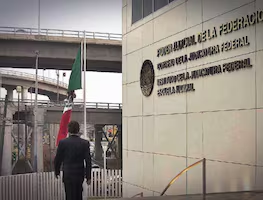Más Información

Trump desata una confrontación interna en México por declarar terroristas a los narcos; Sheinbaum acusa de “entreguismo” a oposición

Avanza repatriación a México de connacionales secuestrados por huitíes; reciben asistencia y protección consular

Canciller De la Fuente dialoga con su homóloga de Canadá, Mélanie Joly; revisan prioridades compartidas del T-MEC 2026
Despite the legal efforts and the treaties signed before international organizations, in Mexico , torture has been documented by national and international human rights organizations , nevertheless, women are the ones who suffer the most.
At the end of the 70s and the beginning of the 80s , Mexico and the world went through a dark period, where torture became a recurrent practice. In 1984 , the United Nations launched an initiative and 156 countries signed the Convention against Torture and Other Cruel, Inhuman or Degrading Treatment ; Mexico signed it in 1985 .
In 1991 , the country established its first federal law to prevent and punish torture . In 2017 , a new law became effective. Currently, torture has been typified as a crime in the 32 states.
Between 2006 and 2016 , out o f 9,870 women deprived of their liberty , 15% of them said they were raped during their arrest , at the Public Prosecutors' Office , or during their stay there.
For every man that was the victim of sexual abuse , three women report sexual abuse . According to the victims , the public servants who torture them during the arrest are members of the Navy, Army, and the Federal Police . The aggressions include threats to file false charges against them, asphyxiation, beatings, burns, electric shocks, sexual violence , and threats to harm their families.
Human rights activists lament that although soldiers, navy officers, and federal police officers have been trained to follow the law , this is not the case.
For experts, these cases have two defined reasons. First, they are the result of a “ perverse logic ” to obtain results and proofs against organized crime at any price, including false charges or through torture . Secondly, because there are no consequences or punishments for those who perpetrated abuses.
The “ perverse logic ” has to be eliminated through the implementation of inescapable protocols during arrests and detentions . Those arrested should know they have rights and the officials have the obligation to respect those rights . No confession obtained through violence is vali d.
Nevertheless, obtaining consequences or punishment for the torturer is a more complicated task because while authorities don't create conditions for the victims to file complaints, victims won't be able to raise their voices .
The panorama is alarming . The eradication of torture would hardly be achieved in the short term, but society, the government, and authorities have to push to eradicate torture in Mexico .
gm








